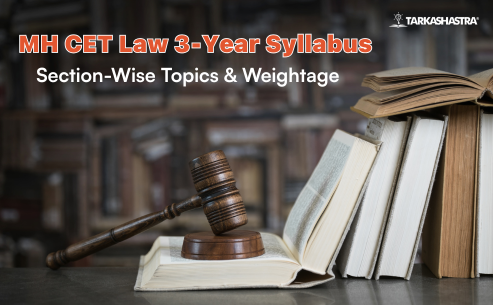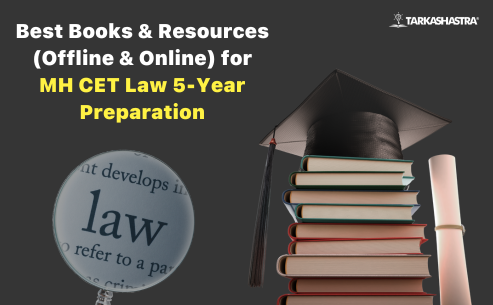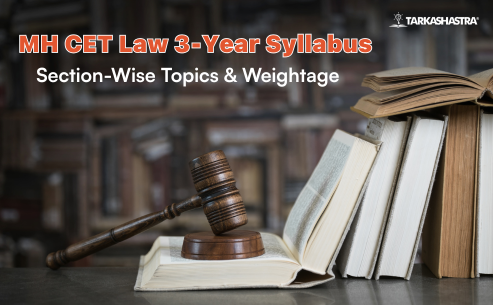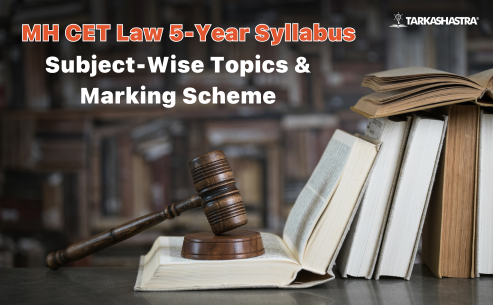Can You Really Crack the MH CET Law 3-Year Exam in 6 Months? Yes, you absolutely can — if you have the proper roadmap.
The MH CET Law 3-Year exam is the gateway to top law colleges in Maharashtra for students who have already completed their graduation. With 189 participating institutes and 19,780 seats, securing a high score in this exam can unlock doors to prestigious government law colleges like GLC Mumbai, ILS Pune, and others.
But here’s the catch — most aspirants start late, either due to academic schedules, job commitments, or uncertainty. That’s why a well-structured 6-month preparation plan is your best bet to stay ahead of the curve.
This blog is designed specifically for:
- Final-year undergraduates
- Working professionals aiming for a career shift
- Repeaters who want a more organised prep strategy
- Anyone serious about cracking the MH CET Law 3-Year exam in just 6 months
What Will You Get From This Blog?
| Benefit | Description |
| Complete 6-Month Plan | Month-by-month guidance on what to study and when |
| Section-Wise Preparation Tips | How to master each subject with focused techniques |
| Mock Test Strategy | When to start, how to analyse, and how many to attempt |
| Recommended Books & Resources | Only the most relevant and reliable prep material |
| Last 30-Day Strategy | What to do in the final sprint to boost your score |
| Common Mistakes to Avoid | Pitfalls that derail many aspirants — and how to stay clear of them |
Whether you’re starting from scratch or picking up from a break, this guide will help you structure your journey, build momentum, and peak at the right time — the day of the exam.
Let’s dive in.
Understanding the MH CET Law 3-Year Exam Pattern
Before discussing preparation strategies, it’s essential to understand what you’re preparing for. The MH CET Law 3-Year exam has a straightforward structure, but, due to its competitive nature, demands high speed and accuracy.
Exam Highlights:
| Feature | Details |
| Exam Mode | Online Computer-Based Test (CBT) |
| Duration | 120 minutes (2 hours) |
| Total Questions | 120 |
| Type of Questions | Multiple Choice Questions (MCQs) |
| Total Marks | 120 |
| Marking Scheme | +1 for every correct answer, no negative marking |
| Medium of Exam | English and Marathi |
Section-Wise Breakup
| Section | No. of Questions | Marks Allotted | Weightage (%) |
| Legal Aptitude & Legal Reasoning | 24 | 24 | 20% |
| General Knowledge & Current Affairs | 32 | 32 | 26% |
| Logical & Analytical Reasoning | 24 | 24 | 20% |
| English | 40 | 40 | 33% |
| Total | 120 | 120 | 100% |
Key Observations:
- English carries the highest weightage and is often underestimated by law aspirants.
- Legal Reasoning is the make-or-break section — well-prepared aspirants can ace this with conceptual clarity and regular practice.
- No negative marking means you should attempt all 120 questions — making intelligent guesses can work in your favour.
- Time is limited — you get less than a minute per question. Hence, speed + accuracy = success.
Why Understanding the Pattern Matters
Knowing the structure helps you:
- Prioritise sections during preparation.
- Allocate time smartly during the exam.
- Set realistic mock test benchmarks.
- Avoid surprises on the exam day.
Now that you’re familiar with the paper structure, let’s move on to how you should plan each month in our 6-month strategy.
Month-Wise 6-Month Preparation Plan for MH CET Law 3-Year Exam
To crack MH CET Law in just six months, you need a balanced strategy — one that steadily builds your concepts, improves your accuracy, and boosts your speed, all while keeping enough time for revision and mocks.
Here’s a detailed month-by-month plan designed to help you progress efficiently:
Month 1: Lay the Foundation
| Task | Details |
| Understand Syllabus & Pattern | Study section-wise topics thoroughly based on the updated 120-mark paper |
| Create a Study Timetable | Set daily goals (2–3 hours/day for working professionals, 4–5 hours/day for full-time aspirants) |
| English | Grammar basics, vocabulary flashcards, 2 RCs/week |
| Legal Aptitude | Read beginner-level legal principles, learn 5 legal maxims/week |
| GK & Current Affairs | Start reading The Hindu or The Indian Express + GKToday daily news |
| Reasoning | Practice basic puzzles, series, and directions |
| Resources Setup | Gather books, enroll in mock test series (Tarkashastra, TopRankers, etc.) |
Month 2: Strengthen Concepts
Focus: Master the basics of Legal Aptitude & Logical Reasoning
| Task | Details |
| Legal Aptitude | Start solving principle-fact questions, understand case law application |
| Logical Reasoning | Topics: Blood relations, number/letter series, direction sense, syllogisms |
| English | Focus on error spotting, fill-in-the-blanks, 3 RCs/week |
| Current Affairs | Revise February–April events + make notes |
| Weekly Assessment | Take 1 mini mock every week (30–40 questions) with analysis |
Month 3: Apply and Test
Focus: Practice sectionally, improve accuracy, and begin mock test discipline
| Task | Details |
| English | Practice para-jumbles, vocabulary from previous mocks |
| GK & Current Affairs | Consolidate March–June, focus on legal current affairs |
| Legal Reasoning | Solve 15–20 principle-fact questions daily |
| Logical Reasoning | Time-bound topic-wise tests (30 mins/day) |
| Mock Tests | 2 full-length mocks (120 questions) this month |
| Error Log | Maintain a notebook of mistakes and learnings from mocks |
Month 4: Mix Practice with Strategy
Focus: Identify weak areas, start full-paper simulation, develop time allocation strategy
| Task | Details |
| Mock Tests | 1–2 full-length mocks every week |
| English | Revision of RC, grammar rules, idioms/phrases |
| Legal Reasoning | Work on speed + accuracy, timed sets of 10–15 Qs |
| GK | Focus on national events, legal developments, government schemes |
| Strategy Building | Analyse time spent per section and adapt allocation plan accordingly |
Month 5: Sharpen and Strategise
Focus: Speed-building, daily revision, and adaptive testing
| Task | Details |
| Mock Tests | 3 full-length mocks/week + alternate day sectionals |
| GK & Current Affairs | Revise last 6 months thoroughly + weekly current affairs quiz |
| English | 4 RCs/week, intensive grammar revision |
| Legal + Reasoning | Back-to-back practice of previous paper patterns |
| Mistake Analysis | Identify patterns in errors and plug gaps |
Month 6: Final Sprint
Focus: Peak performance, mental preparation, and simulated practice
| Task | Details |
| Daily Mocks | 1 full-length test daily (same slot as actual exam) |
| Revision | Legal maxims, current affairs, formula sheets, common vocab |
| Speed Review | Set 30-minute targets per section using mock patterns |
| Mental Readiness | Sleep-wake cycle adjustment, stress handling, avoid burnout |
| Exam Day Strategy | Section order, time per section, intelligent guessing practice |
Monthly Progress Snapshot
| Month | Key Focus | Target Mock Tests | Priority Sections |
| Month 1 | Syllabus coverage, basics | 0 | All (Foundation) |
| Month 2 | Concept mastery | 2 (Mini) | Legal + Reasoning |
| Month 3 | Sectional practice + accuracy | 2 | Legal + English |
| Month 4 | Time strategy + error correction | 4–6 | GK + Speed Optimization |
| Month 5 | Revision + mocks + current affairs | 8–10 | All (Balanced) |
| Month 6 | Simulation + polishing | 12–15 | All (Final Touch) |
This month-wise plan ensures that you:
- Build a solid conceptual base
- Practice regularly with a clear strategy
- Peak your performance in the last 30 days with daily mock simulations
Section-Wise Preparation Strategy for MH CET Law 3-Year Exam
The MH CET Law 3-Year exam tests your aptitude across four major sections: Legal Aptitude, General Knowledge, Logical Reasoning, and English. Each section has a defined weightage and demands a unique approach. Here’s how to crack them one by one:
A. Legal Aptitude & Legal Reasoning (24 Questions | 20%)
What It Tests:
- Legal principles (Contract, Torts, Constitution, IPC)
- Application of legal logic
- Legal maxims and terminology
Preparation Tips:
| Strategy | Details |
| Learn Core Legal Concepts | Focus on basic laws: contracts, torts, rights, duties, and criminal law |
| Practice Principle-Fact Questions | Try 10–15 questions daily to build accuracy and reasoning speed |
| Revise Legal Maxims Weekly | Maintain a flashcard deck of 50+ must-know maxims |
| Stay Updated on Legal Developments | Focus on important judgments and constitutional updates from the past year |
Recommended Resources:
- AP Bhardwaj – Legal Aptitude for CLAT and Other Law Exams
- Universal’s Guide to LL.B.
- Tarkashastra Legal Aptitude Practice Sheets
B. General Knowledge & Current Affairs (32 Questions | 26%)
What It Tests:
- Awareness of recent national & international events
- Static GK: Polity, Geography, History, Science
- Legal current affairs
Preparation Tips:
| Strategy | Details |
| Daily Current Affairs Practice | Read The Hindu, Indian Express, or use apps like GKToday, Inshorts |
| Weekly Revision | Make monthly compilations and quiz yourself on past 4–6 weeks’ events |
| Legal Current Affairs | Focus on SC/HC verdicts, new laws, appointments in judiciary |
| Static GK Snapshots | Revise Indian Constitution, Parliament, Indian geography, basic science |
Recommended Resources:
- Lucent’s GK Book (Static)
- Tarkashastra Monthly GK PDF
- AffairsCloud Monthly Capsule (optional)
C. Logical & Analytical Reasoning (24 Questions | 20%)
What It Tests:
- Analytical ability and logical patterns
- Problem-solving under time constraints
Preparation Tips:
| Strategy | Details |
| Strengthen Core Topics | Blood relations, syllogisms, series, direction sense, puzzles |
| Practice Sets with Timer | Solve 20–25 questions in 25 minutes every alternate day |
| Learn Elimination Techniques | Use options smartly for faster solving |
| Maintain Accuracy | Don’t rush — better to solve fewer questions accurately than all with errors |
Recommended Resources:
- RS Aggarwal – Modern Approach to Logical Reasoning
- Tarkashastra Reasoning Practice Workbooks
- Previous years’ MH CET Law questions
D. English (40 Questions | 33%)
What It Tests:
- Vocabulary, grammar, comprehension
- Language usage and sentence construction
Preparation Tips:
| Strategy | Details |
| Build Vocabulary | Use flashcards, Word Power Made Easy, and read editorials |
| Master Grammar Rules | Tenses, prepositions, subject-verb agreement, modifiers, etc. |
| Practice Reading Comprehension | Do 3–4 RCs per week — focus on legal, socio-political topics |
| Error Spotting & Cloze Tests | Include at least 20–25 grammar MCQs in your weekly plan |
Recommended Resources:
- Wren & Martin – High School English Grammar
- Word Power Made Easy by Norman Lewis
- Tarkashastra English Sectional Tests
Summary Table: Section-Wise Plan at a Glance
| Section | Focus Areas | Daily Target | Resource Suggestions |
| Legal Aptitude | Principles, case studies, maxims | 15 Qs + concept notes | AP Bhardwaj, Universal’s Guide, Flashcards |
| General Knowledge | Current + Static GK | Daily newspaper + 10 MCQs | The Hindu, Lucent GK, Tarkashastra Monthly PDF |
| Logical Reasoning | Puzzles, series, syllogisms | 20–25 Qs on alternate days | RS Aggarwal, Reasoning Workbooks |
| English | Grammar, RC, Vocab | 30 mins RC + 20 grammar/vocab Qs | Word Power, Wren & Martin, Editorials |
With a structured, section-wise focus, you’ll not only boost your strengths but also eliminate weak spots early. Up next, we’ll discuss how and when to start taking mock tests, and how to analyse them effectively.
Mock Tests & Analysis Strategy for MH CET Law 3-Year Exam
If content is the foundation, mock tests are the battleground where your real preparation is tested. Starting early, taking them regularly, and analysing them correctly can make all the difference between a good rank and a great one.
Why Mock Tests Matter
- Simulate actual exam pressure
- Improve time management and question selection
- Help you track progress and identify weak areas
- Build endurance for a 2-hour CBT exam
When to Start Giving Mocks
| Month | Mock Frequency | Type |
| Month 1 | None (focus on building basics) | — |
| Month 2 | 1 mini mock (40–60 Qs) | Sectional |
| Month 3 | 2 full-length mocks | Full Paper (120 Qs) |
| Month 4 | 1–2 full-length mocks/week | Timed & Topic-focused |
| Month 5 | 3 full-length mocks/week | Adaptive difficulty |
| Month 6 | Daily mocks (5–6/week) | Simulated exam with real timing |
Mock Test Schedule: Ideal Weekly Breakdown (Month 4 Onward)
| Day | Activity |
| Monday | Full-length mock test |
| Tuesday | Detailed mock analysis + revise errors |
| Wednesday | Sectional tests (Legal & English) |
| Thursday | GK revision + timed Reasoning practice |
| Friday | Full-length mock test |
| Saturday | Review notebook + error tracking |
| Sunday | Static GK quiz + Legal principle drill |
How to Analyse a Mock Test: Step-by-Step
- Don’t Just Check the Score – Understand why you lost marks
- Time Analysis – How much time did each section take? Were you rushing or stuck?
- Error Log – Maintain a notebook/spreadsheet for:
- Silly mistakes
- Conceptual gaps
- Wrong guesses
- Questions left unattempted
- Topic Tagging – Identify recurring weak topics (e.g., Reading Comprehension, Blood Relations)
- Improvement Plan – Fix 2–3 key areas from each mock in the next 3 days
Mock Analysis Template
| Parameter | What to Track |
| Total Score | Overall out of 120 |
| Sectional Breakdown | Marks in Legal, GK, Reasoning, English |
| Accuracy | Correct vs Attempted |
| Speed | Time taken per section |
| Mistakes | Type (conceptual, silly, guesswork) |
| Lessons Learned | What to fix before next mock |
Golden Rules for Mock Success
| Do This | Avoid This |
| Attempt all 120 questions | Leaving questions just because unsure |
| Stick to a time strategy | Spending too long on tough questions |
| Practice with actual difficulty | Easy mocks that don’t test your limits |
| Revisit mocks after a few days | Analyzing once and forgetting it |
| Track your progress weekly | Random practice without direction |
Mock tests are your trial runs — the more you treat them like the real deal, the more exam-ready you become. But remember, mocks are not just for marks; they are for mastery.
Do’s and Don’ts for MH CET Law 3-Year Preparation
In a competitive exam like MH CET Law, what you avoid doing is just as crucial as what you actively pursue. Many aspirants make avoidable mistakes — like over-focusing on one section or delaying mock practice — which can derail months of effort.
Here’s a crisp breakdown of the do’s and do n’ts every aspirant should follow during their six-month preparation journey.
Do’s: What You Should Be Doing
| Area | Smart Actions to Take |
| Consistency | Stick to your daily timetable — even 2–3 hours/day consistently beats erratic 8-hour study bursts |
| Concept Clarity | Focus on understanding legal principles, grammar rules, and logical patterns — don’t blindly mug up |
| Time-Bound Practice | Use timers during practice sets to simulate exam pressure |
| Mock Analysis | Always review your mock tests — note why you went wrong and revisit weak concepts |
| Daily GK Habit | Read a newspaper or curated daily digest to stay updated — helps both GK and RC |
| Make Summary Notes | Create short revision sheets for legal maxims, vocabulary, and static GK for final month review |
| Track Progress | Maintain a prep journal or Google Sheet to track topic-wise performance and improvement |
Don’ts: Common Pitfalls to Avoid
| Mistake Type | What to Avoid and Why |
| Ignoring English | Don’t assume English is “easy” — it’s the highest weightage section (33%) and can make or break your score |
| Delaying Mocks | Don’t wait till the final month to take mocks — you’ll miss out on growth cycles |
| Over-Reliance on Coaching | Self-study and mock analysis are equally important; coaching is only a guide, not a guarantee |
| Ignoring Current Affairs | Current events (legal + national) are high-scoring if revised regularly |
| Random Study | Don’t jump between topics without strategy — follow a monthly, section-wise plan |
| Panic Before Exam | Don’t change your paper attempt strategy or revise everything in the last 2 days — focus on calm, smart revision |
Bonus Tips from Toppers
- Attempt all 120 questions — no negative marking = higher chance of scoring with educated guesses.
- Develop a paper strategy: e.g., start with Legal → English → Reasoning → GK.
- Keep Sunday for revision and self-evaluation — treat it as your reset day.
Avoiding these common mistakes while sticking to a strategic routine will keep your Preparation disciplined, balanced, and high-impact.
Recommended Books & Resources for MH CET Law 3-Year Exam
Choosing the right study material is like selecting the right weapon for battle — it should be precise, relevant, and practical. With limited time (6 months), you need to avoid overwhelming yourself with too many books and instead stick to smartly curated resources for each section.
Below is a carefully compiled list of recommended books, online resources, and practice tools that strike the right balance between concept-building and exam readiness.
Section-Wise Book Recommendations
| Section | Resource Type | Recommended Materials |
| Legal Aptitude & Reasoning | Concept Book | Legal Aptitude for CLAT & Other Law Exams by AP Bhardwaj |
| Practice Book | Universal’s Guide to LL.B. Entrance Exam | |
| Online Resource | Tarkashastra Legal Worksheets & Topic-wise Tests | |
| Flashcards | 50+ Legal Maxims (Self-made or via Tarkashastra’s Legal Kit) | |
| General Knowledge & Current Affairs | Current Affairs | The Hindu, Indian Express, GKToday app, AffairsCloud Monthly PDFs |
| Static GK | Lucent’s General Knowledge, Tarkashastra GK Quick Notes | |
| Quiz Practice | Weekly GK & CA Quizzes (Tarkashastra / TopRankers platform) | |
| Logical & Analytical Reasoning | Concept + Practice | A Modern Approach to Logical Reasoning by RS Aggarwal |
| Online Practice | Tarkashastra Reasoning Workbooks & Puzzle Practice Sheets | |
| Topic Focus | Topics like blood relations, directions, number/letter series | |
| English | Grammar | High School English Grammar by Wren & Martin |
| Vocabulary | Word Power Made Easy by Norman Lewis | |
| Reading Practice | Hindu Editorials, Law essays, Tarkashastra RC Practice Sets | |
| Mock Focus | Previous year papers, topic-wise English MCQs |
Mock Test Platforms
| Platform | Type | Why Use It |
| Tarkashastra Test Series | Full Mocks + Sectionals | Closely aligned with actual CET format, includes analysis & mentor feedback |
| Tarkashastra | Mocks + GK Quizzes | Good variety in difficulty; strong GK coverage |
| Tarkashastra | Adaptive Tests | Useful for variety; not always CET-specific |
Supplementary Tools (Optional but Helpful)
| Tool/App | Use Case |
| Anki or Quizlet | Flashcards for vocab, legal maxims |
| Grammarly | Grammar correction + English writing aid |
| Google Sheets | Track mock performance and section-wise progress |
| Telegram/Reddit groups | Peer discussion + resource exchange |
Smart Resource Strategy
- One book per section is enough — don’t fall into the “more books = more marks” trap.
- Prioritise test series and practice papers in the last 2 months.
- Use Tarkashastra-curated notes and tests for CET-specific preparation.
Final 30-Day Sprint Strategy: How to Maximise Your Score in the Last Month
The final month before the MH CET Law 3-Year is not about learning new concepts — it’s about sharpening what you already know, managing your energy, and entering the exam with confidence and control.
Here’s a 30-day high-performance plan to help you peak when it matters most.
Week-Wise Breakdown: The Last 4 Weeks
| Week | Focus Areas |
| Week 1 | Full revision of all Legal Aptitude, Reasoning, and English topics |
| Attempt 3 full-length mocks (alternate days) | |
| Consolidate static GK and current affairs notes | |
| Week 2 | Take 4–5 mocks this week with time tracking |
| Practice tough RCs, Legal principle-case questions | |
| Revise vocab (synonyms, idioms, legal terms) | |
| Week 3 | Go into exam simulation mode: give mocks at same time as actual exam slot |
| Focus on weak areas identified via mock analysis | |
| Continue GK quizzes + revision capsules | |
| Week 4 | Light revision only — no new content |
| Daily mocks (but reduce duration by 2–3 days before exam) | |
| Final exam-day strategy and mental readiness |
Revision Tactics That Work
| Area | What to Revise | Method |
| Legal Aptitude | Key principles, maxims, landmark cases | Flashcards + solved examples |
| GK & CA | Static GK, major events from past 6–8 months | Weekly capsules + MCQ quiz |
| English | Grammar rules, RC tone types, para jumbles | Short notes + mock question review |
| Reasoning | Puzzles, direction sense, series | 30-min drills with timers |
Exam-Day Strategy Blueprint
| Strategy Element | Recommended Action |
| Section Order | Start with strongest section (e.g., Legal → English → Reasoning → GK) |
| Time Allocation | Spend max 30–32 mins on English, 25 on Legal, 20 on Reasoning, 18 on GK |
| Guessing Approach | Attempt all 120 questions (no negative marking) |
| Buffer Time | Leave 5–7 mins for review or skipped questions |
| Technical Familiarity | Practice at least 3 mocks on a laptop/desktop in CBT interface |
Mindset & Health Tips Before the Exam
| Tip | Why It Matters |
| Get 7–8 hours sleep | Sharpens recall, reduces fatigue |
| Avoid peer pressure | Don’t compare your mocks or prep progress in the last week |
| Hydrate & eat light | Keeps you alert and avoids sluggishness during paper |
| Don’t over-revise | Trust your prep — clarity > cramming |
| Walk in confident | It’s just another mock — only now, it counts 💯 |
The final 30 days are all about momentum, revision, and mindset. You’ve done the heavy lifting — now is the time to stay calm, execute your plan, and finish strong.
Common Mistakes to Avoid in MH CET Law 3-Year Exam Prep
Even the most sincere aspirants can fall into traps that sabotage their score, often unknowingly. Avoiding these classic CET prep mistakes can save you valuable marks and reduce pre-exam anxiety.
Here’s a list of common errors students make during their 6-month preparation journey — and how you can steer clear of them:
Mistake 1: Starting Without a Plan
Why It Hurts: You end up spending more time on easy topics and ignoring your weak spots.
Fix: Use a structured monthly roadmap (like the one in this blog) to keep your prep focused and balanced.
Mistake 2: Delaying Mock Tests
Why It Hurts: You don’t build stamina, speed, or exam temperament, and panic during the actual exam.
Fix: Start giving mocks by Month 3. Analyse every test to extract at least three lessons you can apply in the next one.
Mistake 3: Ignoring High-Weightage Sections (Like English)
Why It Hurts: English carries the highest weightage (33%), and many aspirants assume they’ll manage it easily.
Fix: Dedicate time to grammar, comprehension, and vocabulary every week — and track your improvement.
Mistake 4: Not Revising GK Regularly
Why It Hurts: Current Affairs is easy to forget if not revised weekly, leading to unnecessary guesswork.
Fix: Make weekly GK summaries and revise them every Sunday. Use quizzes to check recall speed.
Mistake 5: Treating Mocks as Just Practice
Why It Hurts: Taking mocks without analysis means you’re repeating the same mistakes unknowingly.
Fix: Review mocks for:
- Time wasted per section
- Questions you overthought
- Guess vs. logic ratio
- Sections where you peak/struggle
Mistake 6: Panicking in the Final Week
Why It Hurts: Stress kills retention, leads to last-minute cramming, and throws off your rhythm.
Fix: Final week = light revision, full mock simulations, and confidence building, not desperation learning.
Other Minor but Costly Errors
| Mistake | Avoid This By… |
| Skipping reading practice | Doing 3 RCs weekly from editorials or law passages |
| Blindly trusting coaching | Cross-verifying all facts, dates, and strategies yourself |
| Avoiding tough topics | Breaking them into micro-goals (e.g., 5 RCs/week, 10 puzzles) |
| Not practicing in CBT format | Taking mocks in actual computer-based mode |
Final Tip: Keep It Simple, Strategic, and Student-Centric
Your preparation doesn’t need to be perfect — it needs to be practical, consistent, and self-aware. The CET is a test of logic, language, and general awareness, not memory or genius. Be coachable, be reflective, and your score will follow.
Conclusion: Crack MH CET Law 3-Year with Confidence & Clarity
Cracking the MH CET Law 3-Year exam in 6 months isn’t about studying 10 hours a day — it’s about studying smart, staying consistent, and building the right exam temperament.
Whether you’re a working professional, a final-year student, or a serious repeater, this plan gives you:
- A clear path for each month
- Section-wise mastery strategies
- A proven mock test routine
- Tips to avoid common traps
- A final sprint that sets you up to peak on exam day
Remember: You don’t need to do everything, but you must do the right things consistently.
Your Next Step?
- Download monthly current affairs and legal reasoning workbooks from trusted platforms
- Start your first mock test this week — track your score, timing, and learn from your mistakes
- Join a study group or mentorship community (like Tarkashastra’s Law Prep Circle) for motivation and guidance
- Bookmark this guide and revisit the month-wise plan every few weeks to realign your strategy
Your MH CET Law journey starts today. In six months, you could be walking into GLC or ILS.
The clock is ticking. Let’s make it count.
FAQs: MH CET Law 3-Year Exam – 6-Month Preparation Strategy
- Can I really prepare for the MH CET Law 3-Year exam in 6 months?
Yes, 6 months is more than sufficient if you follow a structured month-wise plan. With consistent practice, focused revision, and mock test analysis, many aspirants have cracked CET in even less time.
- How many hours should I study daily for this exam?
Ideally, 2–3 hours a day works for working professionals, while full-time aspirants should aim for 4–5 hours. The key is consistency, not intensity — make every hour count with smart study.
- Is English necessary for the MH CET Law?
Yes, English carries the highest weightage (40 out of 120 marks). It includes vocabulary, grammar, and comprehension — scoring well here can significantly boost your overall percentile.
- When should I start mock tests during my preparation?
Start with mini-mocks by Month 2 and take full-length mocks from Month 3 onwards. Mock tests are essential to build speed, exam temperament, and time allocation skills.
- Is there negative marking in the MH CET Law 3-Year exam?
No, there is no negative marking in this exam. This allows you to attempt all questions, so intelligent guessing in uncertain questions can actually work in your favour.
- Which section should I attempt first in the exam?
Start with your strongest section — for most, that’s Legal Aptitude or English. This helps build confidence and saves time, allowing you to tackle tougher sections later with a calm mind.
- Can I prepare for MH CET Law without coaching?
Yes, self-study is absolutely possible with the right resources. A mix of NCERT-level basics, targeted practice, mock tests, and smart revision can help you succeed without formal coaching.
- What are the most critical topics in Legal Aptitude?
Focus on legal principles, contracts, torts, criminal law, and legal maxims. Also, practice fact-principle questions, as they’re commonly asked and test both logic and interpretation.
- How far back should I study current affairs for this exam?
Prepare current affairs from at least the past 6 to 8 months before the exam. Prioritise legal events, government schemes, national news, appointments, and recent bills or judgments.
- How many mock tests should I attempt in total?
Aim for at least 20–25 full-length mocks before the exam. Start slow and increase frequency — especially in the final 2 months, when mock-based revision should be your primary focus.
- Are online test series sufficient for MH CET Law prep?
Yes, good quality online test series like Tarkashastra are tailored for MH CET and offer full mocks, sectionals, and analysis. They also help simulate the actual CBT exam format.
- How significant is regular revision during these 6 months?
Revision is non-negotiable. Without it, even strong concepts fade. Create weekly revision slots for Legal maxims, GK notes, vocabulary, and previously attempted mocks.
- What should I do if I’m weak in Logical Reasoning?
Begin with core topics like series, puzzles, and syllogisms. Practice with a timer and use elimination strategies. Consistent effort — even 20 questions/day — will lead to noticeable improvement.
- Do I need to prepare legal current affairs separately?
Yes. Focus on recent Supreme Court judgments, major legal reforms, and appointments in the judiciary. These questions often appear in both the Legal and GK sections.
- How can I improve my Reading Comprehension skills?
Read editorials from The Hindu or The Indian Express daily. Practice RC passages 3–4 times a week and focus on tone, inference, and vocabulary usage. This builds both speed and comprehension accuracy.
- What is the right way to analyse a mock test?
Don’t just check your score. Track time spent per section, types of errors, and question selection. Maintain a logbook to record learnings from each mock and revise it weekly.
- What’s the biggest mistake students make during CET prep?
Most students delay mock tests and ignore English and GK till the end. These are scoring sections — starting them early can create a significant edge in percentile.
- Is the MH CET Law 3-Year exam conducted in Marathi?
Yes, the exam is available in both English and Marathi. However, due to terminology and comprehension nuances, the legal and English sections are best attempted in English.
- How do I stay stress-free during the final weeks?
Switch to light revision and mock simulations. Get proper sleep, avoid new material, and focus on confidence-building. Trust your process — stress won’t improve your preparation.
- What should my focus be in the final 7 days before the exam?
Practice one mock test daily, revise error logs, flashcards, and static GK, simulate the exam environment, fine-tune your strategy, and avoid overloading your brain with new topics.







